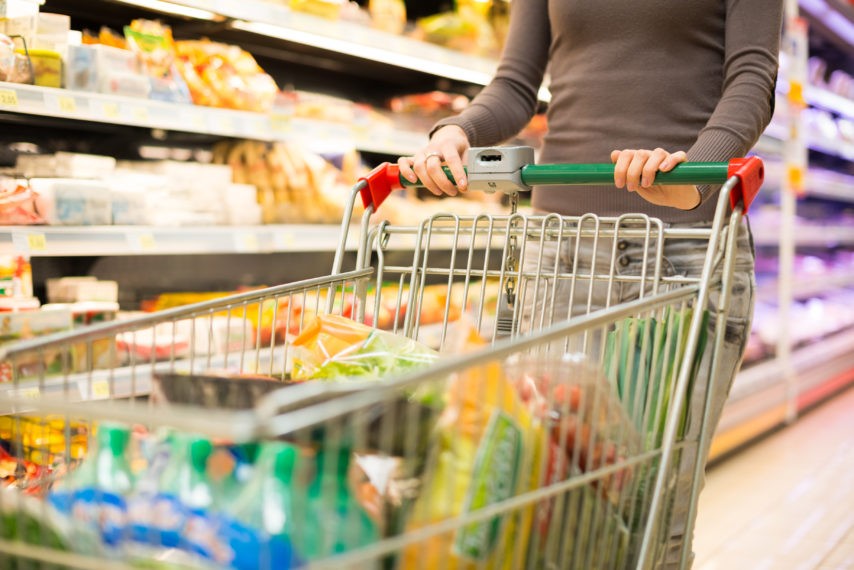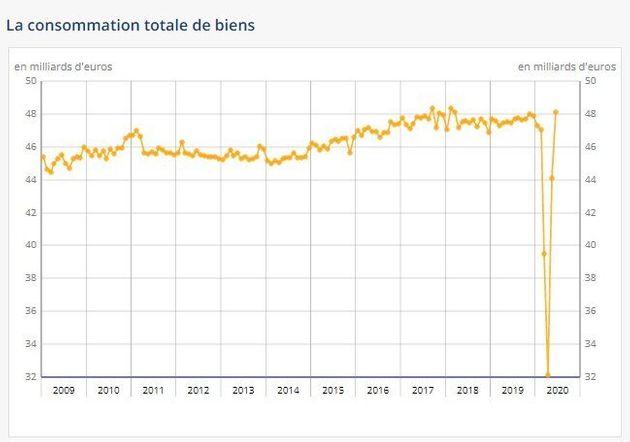Consumption is picking up strongly in France: is it enough to boost economic growth?
According to INSEE, the French national statistics institute, household consumption was higher in June than prior to the coronavirus outbreak in February.

Should we be wrong to celebrate? Household consumption spending was stronger in June than before the coronavirus crisis, INSEE said on Friday, July 31, boosted mainly by an increase in spending on manufactured goods.
After falling sharply during the lockdown, household consumption spending in June was 2.3% higher than in February, the statistical institute revealed. “This increase is mainly driven by the consumption of manufactured goods”, which rose by 5.8% compared to the second month of the year, which preceded the pandemic wave and the lockdown in France, according to the INSEE press release.
READ ALSO – New car registrations up 3.92% in July in France
Among manufactured goods, spending on durable items rose “very strongly” by 7.3% compared with February, especially purchases of new vehicles. Expenditure on housing equipment jumped sharply (+21.6%).
Food consumption, which was higher than the pre-crisis figures at the time of lockdown, stabilised at +0.2% compared to February. Expenditure on energy remains lower than in February, at -1.8%.

Consumption, a partial tool to boost growth
But over the whole of the second quarter of 2020, household consumption of goods fell sharply, by 7.1% following a drop of 6.8% in the first quarter, according to the statistical institute.
According to INSEE, in the spring France suffered its biggest decline in activity since at least 1949, with gross domestic product (GDP) plunging 13.8% in the second quarter. So, could this apparent catch-up in household consumption figures be a driver for reviving growth?
Yes and no, according to Xavier Timbeau, director of the French Economic Observatory (OFCE). He believes that the 75 billion euros saved by the French during the crisis would represent “only half” of the “business losses linked to lockdown. The other missing part is essentially linked to business investment, but also to the lack of consumption by foreign tourists, which will not be recovered”.
As the economist points out, the total expenditure of these savings would not solve all the problems and could even lead to distortions. “Some services, such as restaurants and nightclubs, remain problematic. It’s still difficult to get on a plane. If you have fewer travellers, you build fewer planes. This situation is likely to last, but it is very difficult to forecast. It affects about 10% of the economy, where we expect activity to drop by between a third and a quarter. It is likely to trigger lasting social and economic problems,” explains Xavier Timbeau.
READ ALSO – Renault : the latest financial results look disastrous
Confidence, the cornerstone challenge
For Timbeau, however, the savings made by the French during lockdown represent a “massive recovery plan” in the “hands of consumers. And for these savings to be spent, it needs one key factor: confidence. This will be the tremendous challenge of the government’s recovery plan: restoring confidence to push people to spend. The government is already partly sending this message when it promises not to raise taxes.”
But this presupposes that the French are prepared to reinvest all their savings. Basing itself on a 2011 INSEE study, the OFCE thus recalled, in a note released on June 26, that when presented with an income surplus, “20% of households respond that they would save their additional income, with a slightly higher inclination to save for the wealthiest households”.
Also, “an average of 20% of households say they would like to spend more on leisure or holidays,”, but given current restrictions, “a significant share of the savings that could have flowed into these sectors” is likely to continue to be saved by households.
“In the end, a large part of the 75 billion euros accumulated from 17 March to 5 July may not be used up, at least in the short term,” the OFCE believes.